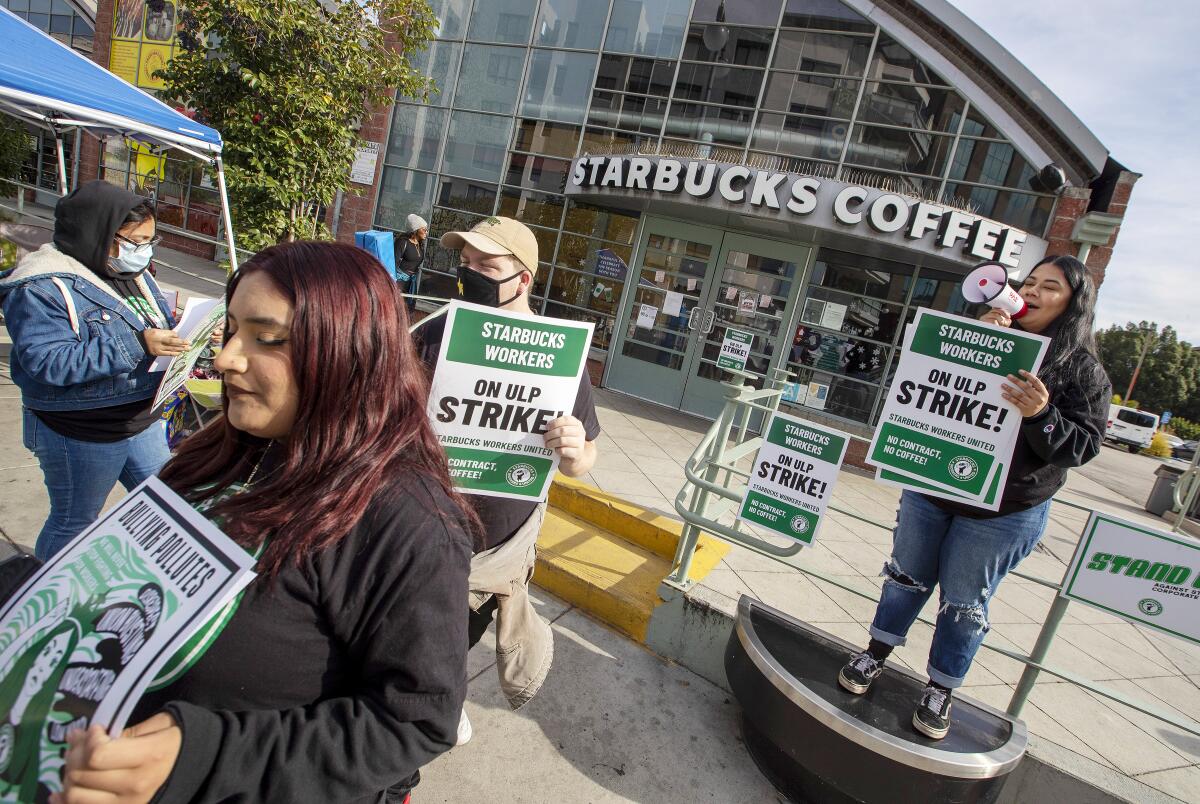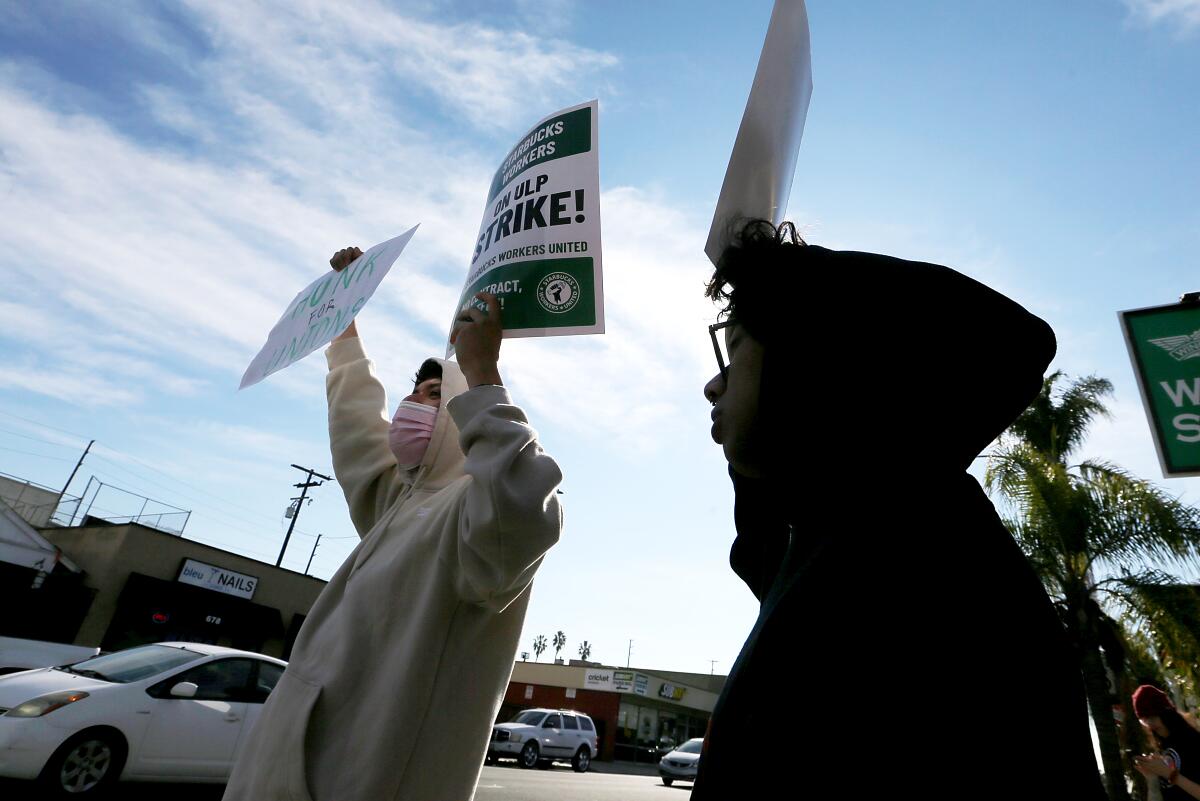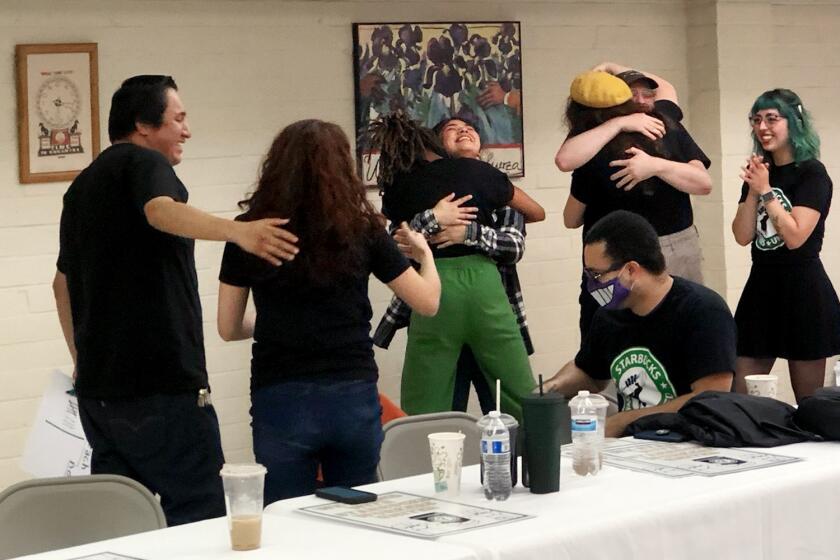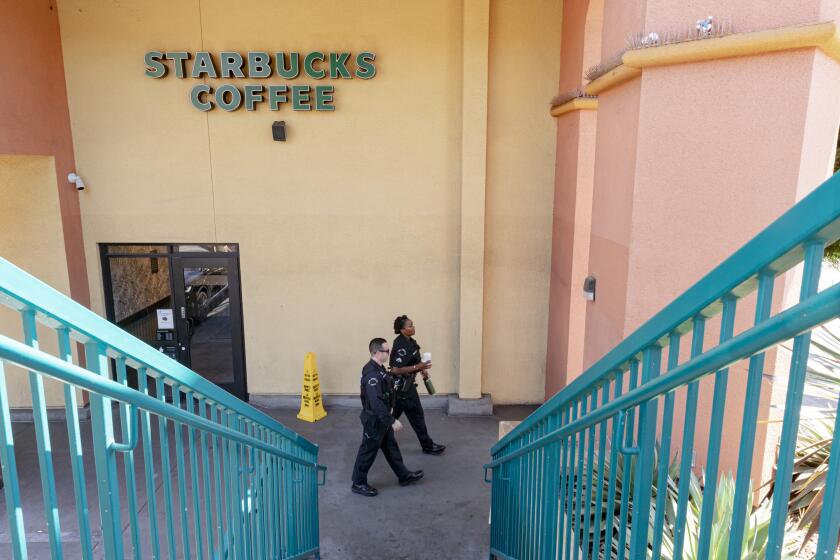L.A.-area Starbucks workers join nationwide strike of unionized employees

Four Los Angeles-area Starbucks stores closed Friday morning as employees took to the picket line, joining a three-day nationwide strike of unionized baristas and other staff demanding better treatment from their corporate leaders.
The strike is the second by Starbucks employees in recent weeks over concerns that the Seattle-based chain has unfairly retaliated against unionized workers and failed to bargain in good faith to reach first-time contracts.
“We’re on strike right now ... demanding it stop closing union stores, they reopen the stores they have closed, and [stop] their union-busting campaign against us,” said Tyler Keeling, a union organizer at the Lakewood Starbucks on Candlewood Street. Strikers plan to remain on the picket line through Sunday, forcing the four stores to remain closed.
Starbucks, in a statement, said that the company had “no tolerance for any unlawful anti-union behavior” and that it had continued to schedule bargaining sessions with union members so “their voices are heard.”
“It is unfortunate that Workers United continues to spread misleading claims while disrupting the Starbucks Experience that our partners and customers have come to love and expect,” the statement said.
The other closed stores were at 3390 E. 7th St. in Long Beach and, in Los Angeles, at 138 S. Central Ave. and 3241 Figueroa St.
Veronica Gonzalez, who works at the Figueroa Street location in Cypress Park, joined the picket line Friday with about 10 other workers, standing in the driveway of the coffee shop with signs that said “Strike!” and “No contract, no coffee!”
Every few minutes, drivers honked their horns or waved in support of the striking baristas.
“Starbucks is doubling down in the union busting, so we’re going to double down,” said Gonzalez, a barista who has worked at the store for three years. “They want to shut down stores, we’re going to show them we can shut down stores too.”

The stores are among 270 Starbucks locations across the nation that have unionized in the last year — part of a wave of labor movements that has swept the nation, including a strike by University of California academic workers and organizing by Amazon warehouse employees. The Workers United guild, which represents Starbucks employees, said about 100 stores across the U.S. were on strike beginning Friday.
“Every step we take is inspiring more workers to take power back to themselves and to create change in the workplace,” Keeling said. “We don’t have to sit down and accept these horrible working conditions; we can make a change.”
Starbucks, citing safety concerns, recently announced the permanent closure of the first Seattle location to unionize; union leaders noted the closure fell near the first anniversary of the first Starbucks winning a union election. Workers United called it part of an “anti-union campaign” by the company.
A national labor movement sweeping through the coffee chain has arrived in Southern California, with two stores voting to unionize.
The chain closed a number of Starbucks stores this summer, also citing safety reasons, including six in L.A. None of the locations in Los Angeles were union shops, but union leaders at the time viewed the move as a “response to the growing union movement spreading across the country.”
The relationship between Starbucks — which opposes unionization — and its unionized employees has become increasingly contentious over the last year, with Workers United leaders asking a federal court to intervene four times in matters of alleged unfair labor practices, such as the firing of union leaders and the withholding of pay hikes. Starbucks has also alleged unfair labor practices by the union.
The company has asked the national labor board to temporarily halt all U.S. union elections, citing allegations that regional labor officials in Kansas improperly coordinated with unionizing workers.
While many Starbucks customers and workers said they understood concerns around stores given the worsening homelessness crisis and an uptick in crime, some questioned the decision.
“We remain focused on working together ... to make Starbucks a company that works for everyone,” the statement from the company said. Starbucks touted its attendance at bargaining sessions; officials planned to appear at more than 75 sessions through the end of the year. But L.A.-area union leaders said none of the sessions had led to meaningful discussions.
“We were literally reading our proposals to them and they walked out while we were still speaking,” said Josie Serrano, a barista at the East 7th Street store in Long Beach. Other union leaders said their stores’ bargaining sessions lasted just minutes before Starbucks’ representatives left.
“We want them to negotiate in good faith,” said Araseli Romero, a 22-year-old shift supervisor at the Central Avenue location. She said the latest bargaining session lasted seven minutes before management and lawyers walked out.
Workers at all four locations maintained that there were problems with faulty equipment, that they were short-staffed despite employees being available to work, and that they were given too few hours to qualify for benefits.
At the Figueroa Street location, protesters cheered as cars honked and waved, and they talked about the issues with passersby. One driver in Long Beach stuck a thumbs-up out the window, yelling, “Let’s go!” A Metro bus driver held down his horn as he passed the coffee shop’s picketers.
But some weren’t supportive of the strike, as they tried to get coffee at the closed shops. Darren Burtenshaw walks every day to the Central Avenue shop with his dog Eros and said he was disappointed to see workers taking a stand against a company that he saw as better than most — offering more than minimum wage and programs to help pay for college.
“They should be targeting other places and big corporations,” the 57-year-old said. Starbucks “is actually doing very well by their employees.”
But Gonzalez said that was exactly why she joined the union and was on the picket line: to help people understand the conditions workers actually faced.
“They claim to be people over profit, but they’re really not,” she said. “We don’t see things getting better, and if we’re not going to stand up for ourselves, who is?”
More to Read
Sign up for Essential California
The most important California stories and recommendations in your inbox every morning.
You may occasionally receive promotional content from the Los Angeles Times.













